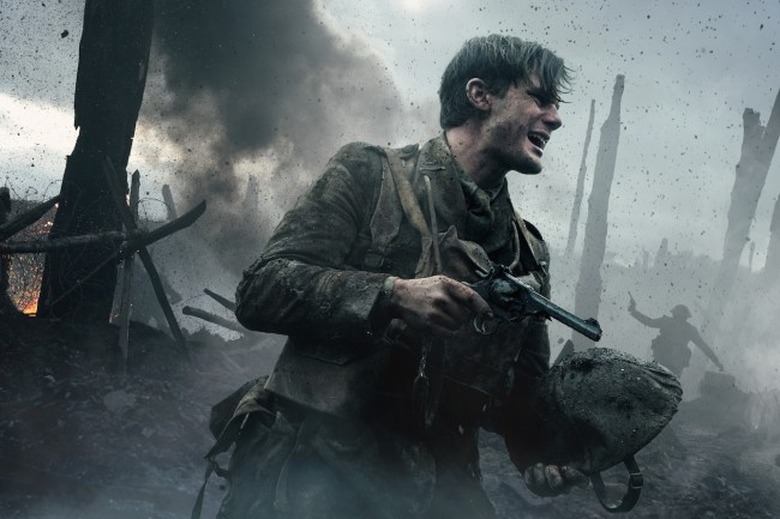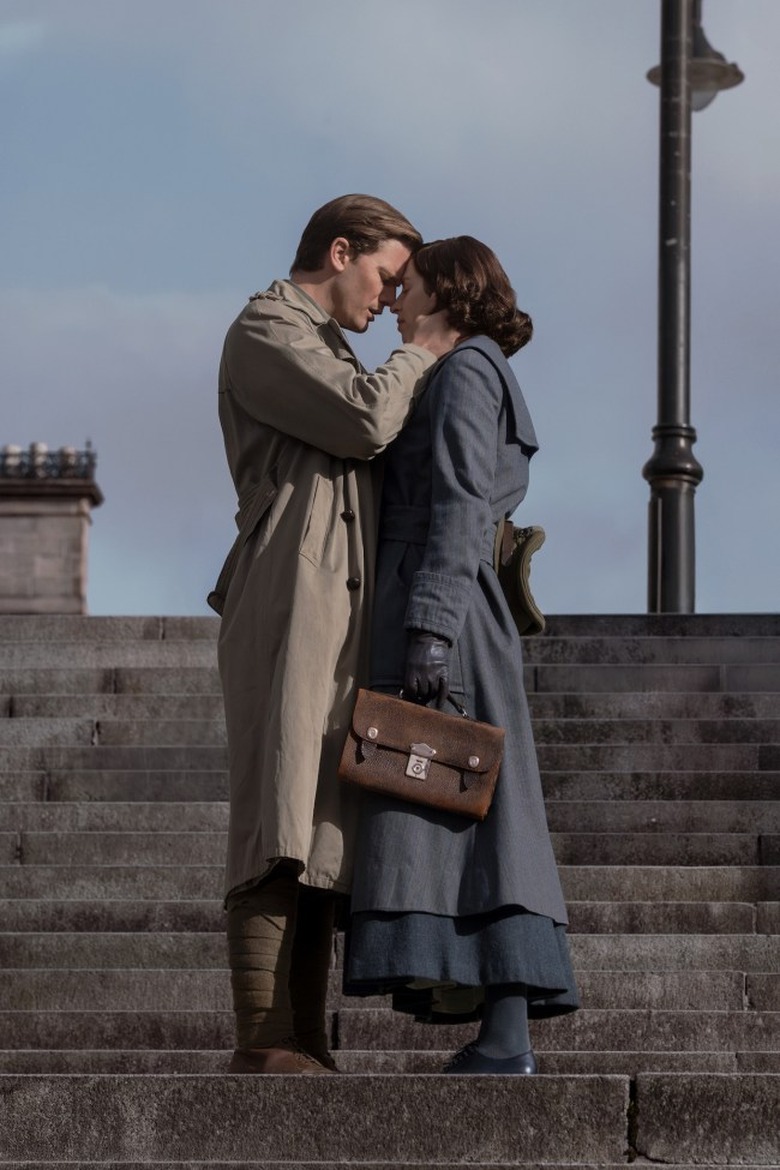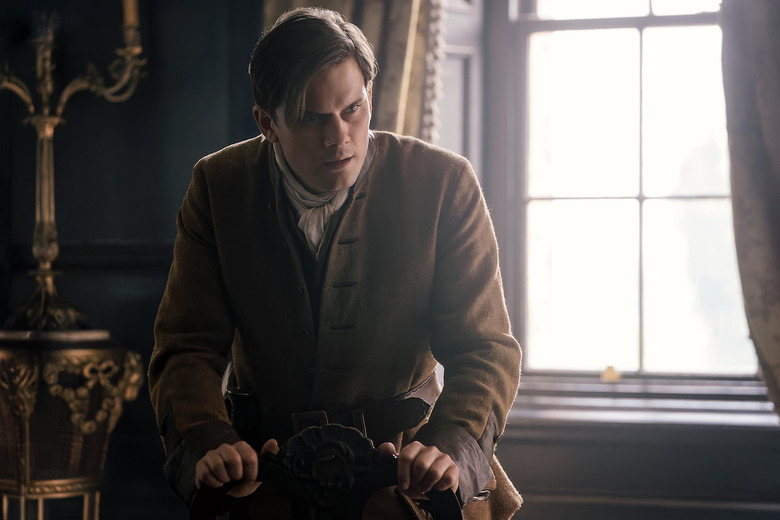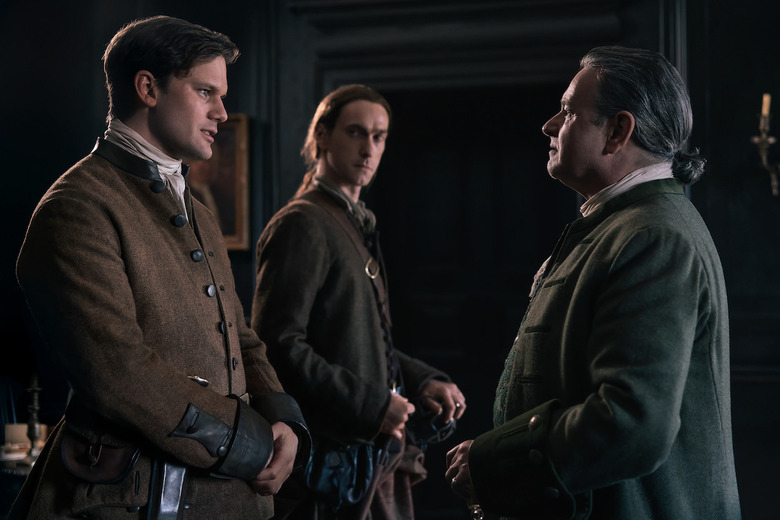Outlander: Blood Of My Blood's Jeremy Irvine Goes Deep On Henry's Delusional Interlude With [Spoiler]: 'Just Wait For Season 2'
Warning: This post contains major spoilers for Outlander: Blood of My Blood Season 1, Episode 6. Proceed accordingly.
If you thought Outlander: Blood of My Blood's Henry was distraught at the end of this week's episode, just imagine how bad he's going to feel when he wakes up and realizes what he's done — and with whom he's done it.
The time-traveler received terrible, albeit false, news in Episode 6: A midwife who'd been paid to lie informed him that Julia and their baby had died during childbirth, their bodies thrown in a pauper's grave. The shock of losing his wife and child immediately triggered Henry's World War I-induced post-traumatic stress disorder, eventually leading him to a delusional state in which he thought he and Julia were celebrating the end of the war in London.
As Henry pulled Julia close and kissed her, the audience saw that he'd really gone to the brothel where Seema works, and he was embracing her. So while Henry imagined he was making love to his wife, he was really having sex with a woman who definitely knew he wasn't in his right mind... but did nothing to stop the proceedings. (Read a full recap here.)
Jeremy Irvine plays the beleaguered, bereaved Henry. Below, he and I chat about that heartbreaking end of the episode, Henry's relative ease navigating the 18th century and how a minor character may prove quite important in the already-ordered Season 2.
TVLINE | We talked a little bit about this when you were when you were in New York, but Henry has a much smoother entry into 18th-century Scotland life than Julia does. I would argue maybe easier than any time-traveler we've seen in Diana Gabaldon's universe. What do you think it is about him that made him able to roll with what happened so easily?
JEREMY IRVINE | Well, it's, it's something I've thought about a lot, because, you know, how do you play going back in time? I settled on [the idea that] you're going back to a time when witchcraft and fairies were very real to the people back then. And to be an outsider was very dangerous and maybe even meant death. So he has to think very, very quickly and really have his wits about him, and survive on those wits, I suppose. For him, it's more about getting through each moment than having this big breakdown of, 'Jesus, I've gone back 200 years.' He's just trying to survive one minute to the next, and just trying to get back to Julia.
TVLINE | At the Grants', he's confronted with some brutal violence, right away: He sees his predecessor's head on a spike. When he comes on board to work with the family, is that threat of violence — either against him, or that he would have to perpetrate against others — in his mind as he moves forward?
I think it is. You've always got to remember where he's come from. He's come from the trenches of the First World War, which, talk about violence on a grand scale. That was the first sort of mechanized war, or global mechanized war. So it's not something that he's unfamiliar with, and he has that violence in him, as well. He's quite capable of taking care of himself when he needs to. But yeah, this is a man who's just found peace and happiness who is suddenly thrown back into a real fight for survival again, I suppose.

TVLINE | Can we take a sidebar? Good God, those trench scenes. Tell me what it was like with all the yelling and the mud and blood.
Do you know what? It was fine. I always love doing stuff like that cause, as a kid, especially as someone who was a little boy, you spend your entire time running around your backyard pretending with toy guns to be in a war, and now I get paid for it. [Laughs] It's great fun. I've done a few war movies in the past. I did the movie of War Horse. And this, I know it looks huge; the set itself looked exactly like being on a $100-million movie. It was that scale, and it was the first time that I realized, "Oh jeez, this is a big show."
I haven't been doing this forever, but I've been doing it long enough now that I just really enjoy that stuff, when get to do things like that. So many jobs you do and you're just in front of a green screen the whole time. This, it was all there. They turned the entire quarry into [the Battle of] Passchendaele. We had hundreds and hundreds of extras. We had explosions going off left, right and center, and machine guns. It's such a laugh, you know? There's a guy, he is my stunt double on quite a lot of stuff, and we're good friends. He got to come on for a few days. His name's James Harris, and he's my doppelganger.
TVLINE | I've read that you're kind of Method sometimes. Is that accurate?
I'm always a bit confused by the word "Method." I think there are roles that require it — not all the time. I don't really understand what happens if you are a Method actor, when, you know, your mum calls you on your phone and you're meant to sort of go, "What is this strange talking device?" [Laughs] I don't get that. But I like to immerse as much as is necessary and reasonable, and it doesn't get in the way of other people's work. I've certainly worked with actors who like to do that at the expense of their other castmates. You know, playing an a—hole doesn't mean you have to be one.
TVLINE | Was there anything immersive that you did for Henry?
No. I mean, the problem with film and TV is, you've got to show up Day 1 and be as into your character [as possible]. You never do know as much as you do at the end, but there's no rehearsal. It's not like you get to come and spend three months in your character on set before the cameras are turned on. So you need to have done your homework. I do my own things. I tend to do it privately, on my own. So there are things. If it's a really serious scene, then I'm probably going to try and stay in it between takes. But most of the time, as soon as the take's over, I'm having a laugh with whoever's next to me.

TVLINE | I want to talk about Episode 6. It's interesting to me that when Henry gets this terrible news about Julia and the baby, his PTSD-addled brain goes back to the day the war ends. Do you have any thoughts about why that specific experience was the one his mind took him to?
I think it's a happy memory he has with Julia, and it's a very safe memory. I think he immediately goes back to — you know, there's danger and terror and grief — [and he goes back to] "When was I most safe? When was I happiest?" And it goes back to this very beautiful moment with her.
I really liked it because it's so fun to play extremes and then go straight to the other extreme in the scene... He would die for Julia. So the pain of losing her has to be so extreme, and you have to feel all of that in this real breakdown, and then turn that into elation. The laughing and stuff wasn't written into it. I was just like, "How far can I get away from that, and go into that?" And when I was doing it, I thought how disconcerting it would be to watch someone do that, and how unsettling would that be? And to try and make it as unsettling as possible, so that we don't hate Henry when he goes to Seema. It's very important that we understand that this is a very damaged man doing that. This isn't him going, "Oh great, now I can go and f–k a prostitute."
TVLINE| I don't hate Henry, but I have thoughts about Seema in that scene.
Well, just wait for Season 2.
Now it's your turn. What did you think about the episode? Hit the comments and let us know!

